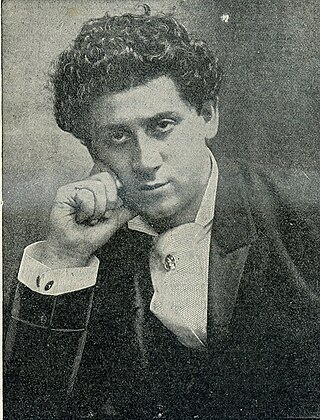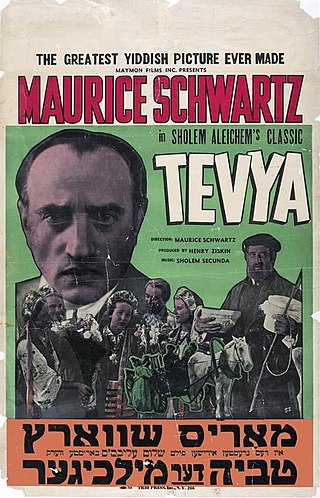
Mendele Mocher Sforim, born Sholem Yankev Abramovich or S. J. Abramowitch, was a Jewish author and one of the founders of modern Yiddish and Hebrew literature. His name was variously transliterated as Moykher, Sfarim,Seforim, etc.

S. An-sky, born Shloyme Zanvl Rappoport, was a Jewish author, playwright, researcher of Jewish folklore, polemicist, and cultural and political activist. He is best known for his play The Dybbuk or Between Two Worlds, written in 1914, and for Di Shvue, the anthem of the Jewish socialist Bund.

Boris Thomashefsky, born Boruch-Aharon Thomashefsky, was a Ukrainian-born Jewish singer and actor who became one of the biggest stars in Yiddish theater.

Celia Feinman Adler was an American actress, known as the "First Lady of the Yiddish Theatre".

Bessie Thomashefsky, born Briche Baumfeld-Kaufman, was a Russian-born Jewish American singer, actress and comedian, a star in Yiddish theater beginning in the 1890s. She was the wife and stage partner of Boris Thomashefsky, the most popular Yiddish leading man of his era. Probably her most famous role was the title role of Oscar Wilde's Salomé at the People’s Theater in 1908.

DavidBergelson was a Yiddish language writer born in the Russian Empire. He lived for a time in Berlin, Germany, before moving to the Soviet Union following the Nazi rise to power in Germany. He was a victim of the post-war antisemitic "rootless cosmopolitan" campaign and one of those executed on the Night of the Murdered Poets.

James Lewis Hoberman is an American film critic, journalist, author and academic. He began working at The Village Voice in the 1970s, became a full-time staff writer in 1983, and was the newspaper's senior film critic from 1988 to 2012. In 1981, he coined the term "vulgar modernism" to describe the "looney" fringes of American popular culture.

Tevya is a 1939 American Yiddish film, based on author Sholem Aleichem's stock character Tevye the Dairyman, also the subject of the 1964 musical Fiddler on the Roof. It was the first non-English language picture selected for preservation by the National Film Registry.
Patrick Conrad is a Flemish painter, poet, screenwriter and novelist, and one of the founders of The Pink Poets. He also directed about twenty movies for cinema and television, including – selected for the Cannes Festival - the international cult film Mascara. As a painter and collage artist he showed his Work in about 40 solo exhibitions in Belgium and France and three retrospective exhibitions of his work: in 1975, in 2005 and in 2022 in the Verbeke Foundation. His work is part of important private collections in France, Belgium, England, Scotland, Germany, Holland, Denmark, Australia and U.S. He lived 34 years in the south of France and moved in 2023 to Porto Alegre (Brasil). In Belgium he is represented by the Paul Verbeke galery which published an artbook about his work.
The New York Jewish Film Festival (NYJFF) is an annual festival in New York City that features a wide array of international films exploring themes related to the Jewish experience. The Jewish Museum and The Film Society of Lincoln Center work in partnership to present the NYJFF every January. Since its creation in 1992, the festival has more than doubled in size and scope. Screenings are typically followed by discussions with directors, actors and film experts. Audience participation is encouraged.

Osip Dymov was the pseudonym for Yosif (Osip) Isidorovich Perelman (1878–1959), a Russian writer. His brother was popular-science writer Yakov Perelman.

Chantal Ringuet is a Canadian scholar, award-winning author and translator.

Yiddish cinema refers to the Yiddish language film industry which produced some 130 full-length motion pictures and 30 shorts during its heyday from 1911 and 1940. Yiddish film almost disappeared after World War II, due to the Holocaust and the linguistic acculturation of Jewish immigrants, though new pictures are still made sporadically.

Abraham "Art" Shryer was a Russian-born American Klezmer cornetist, bandleader, and recording artist who was active in the New York City area in the 1920s and 1930s. In the late 1920s he recorded a number of Jewish and other Eastern European music sides for Brunswick Records, Vocalion Records, and Victor Records.

Florence Weiss was a Russian-born American Yiddish theatre, Vaudeville and film actor, recording artist, and soprano who was active from the 1920s to the 1960s. She worked and performed with such artists as Moishe Oysher, Alexander Olshanetsky, Boris Thomashefsky, Fyvush Finkel, and Abe Ellstein. The height of her popularity was during the 1930s, when she often toured and performed with her then-husband, Moishe Oysher, and appeared in three Yiddish-language films with him: The Cantor's Son, The Singing Blacksmith, and Overture to Glory.
Jolly Paupers is a 1937 Yiddish-language black and white comedy film shot in Interwar Poland by Kinor film company in 1937. It was directed by Léon Jeannot and Zygmunt Turkow and starred the popular Polish comic duo Shimon Dzigan and Israel Shumacher. The film was a satire on the life and culture of shtetl.
Kathryn Ann Hellerstein is an American academic and scholar of Yiddish-language poetry, translation, and Jewish American literature. Specializing in Yiddish, she is currently a professor of Germanic Languages and Literatures and the Ruth Meltzer Director of the Jewish Studies Program at the University of Pennsylvania. She is known for her research focus on Yiddish women writers, notably Kadya Molodowsky, Malka Heifetz Tussman, and Celia Dropkin.

Samuel Goldenberg (1883/1884–1945) was an actor in Yiddish theatre on stage and screen.
Shir Hashirim is a 1935 lost Yiddish-language film.

S.L. Shneiderman was a prominent Polish-American Jewish writer, journalist, translator and poet, who wrote in Yiddish and English.















